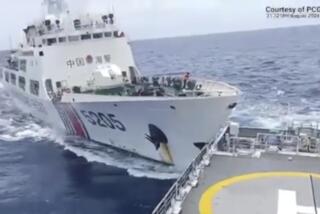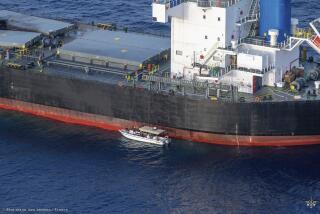No Weapons Chemicals Found on Gulf Ship, China Says
- Share via
BEIJING — The inspection of the Chinese merchant ship Yinhe in the Persian Gulf failed to turn up any of the chemical weapons materials that the United States, whose Navy had been shadowing the ship for more than a month, said were aboard en route to Iran, a government spokesman in Beijing said Thursday.
In Washington, State Department spokesman Mike McCurry told reporters Thursday that “the cargo that’s inspected so far from the Yinhe has not found any evidence of chemical weapons precursors, but the inspection itself has not been completed. . . . That’s going to take at least several more days, I am told.”
If the Chinese are right, it could become a major embarrassment for U.S. intelligence agencies that asserted that the Yinhe carries two chemicals used in the production of two poison gases, nerve gas and mustard gas.
“The inspection on all the cargo on the ship loaded at a Chinese port, including that transshipped from Hong Kong destined for Iran, showed that the ship did not carry at all the two chemicals of thiodiglycol and thionyl chloride, thus proving the repeated clarifications made by the Chinese side to be true,” Foreign Ministry spokesman Wu Jianmin said in a briefing.
It was unclear from Wu’s comments whether Saudi Arabian inspectors, working with U.S. experts, had looked into all 600 containers aboard the Yinhe or simply the 24 to 26 containers thought to be bound for Iran, which used chemical weapons in its 1980-88 war with Iraq. Wu declined to elaborate on his brief comments, saying that an official Chinese report on the matter would follow.
The Chinese maintain that the 19,237-ton ship, with a crew of 28, is carrying paper products, metals and machine parts destined for Iran via the Persian Gulf port of Dubai. U.S. warships had followed the Yinhe for weeks. A combination of U.S. diplomatic pressure and the publicity had made several ports in the region reluctant to allow the ship to dock, prompting the Chinese government to accuse the U.S. government of international bullying.
Under a precedent-setting compromise, Saudi Arabia offered to act as a neutral third party, and the ship was inspected this week by Chinese and Saudi officials, in consultation with U.S. experts, in the Saudi port of Dammam.
Unless the United States is able to support its allegations that the Yinhe is loaded with the lethal chemical agents, the Chinese are likely to use the search as evidence of their assertion that U.S. intelligence agencies have acted on erroneous information.
In addition to the Yinhe episode in the Gulf, the Chinese government contends that the United States had faulty intelligence when it accused China of exporting missile components to Pakistan last fall, in violation of an international arms control agreement. Last week, the United States imposed trade sanctions against China because of the claims.
Despite the face-off between Washington and Beijing over the Yinhe and the missile allegations, both sides appeared in the last week to be making an effort to ease recent tensions in the relationship.
On Tuesday, Assistant Secretary of State Winston Lord said the Clinton Administration, under pressure from pro-China lobbyists who say the sanctions could cost American businesses several hundred million dollars in lost sales, is open to a possible negotiated settlement to the sanctions issue.
In his press briefing Thursday, Foreign Ministry spokesman Wu echoed Lord’s conciliatory words: “When solving state-to-state disputes, China always favors the approach of holding dialogue and opposes sanctions,” he said.
More to Read
Sign up for Essential California
The most important California stories and recommendations in your inbox every morning.
You may occasionally receive promotional content from the Los Angeles Times.













